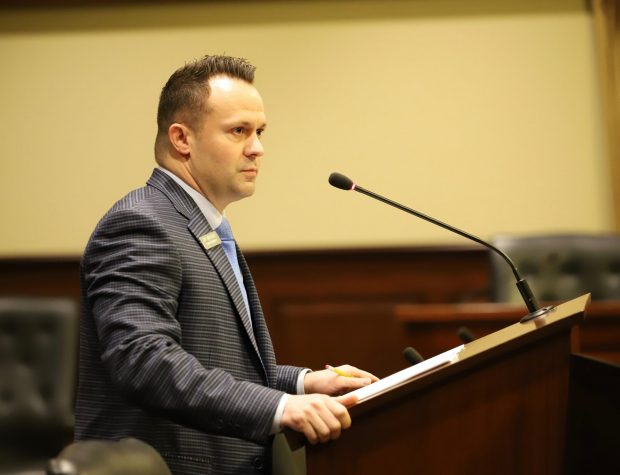Lawmakers got their first look Wednesday at a new bill aimed at restricting minors’ access to “harmful” library books.
After multiple tries with similar legislation in recent years, the new version seeks to appease concerns from Gov. Brad Little, who last year vetoed a bill that had stricter penalties.
The new bill allows the parent or guardian of a minor to file a request to relocate “harmful” material to an adults-only section in a public library or school library — including both public and private schools. If library officials don’t relocate the book, movie or other material within 30 days, they’d be liable for civil penalties.

The legislation calls for $250 in statutory damages. “I guarantee that won’t bankrupt any library here in Idaho,” bill sponsor Rep. Jaron Crane, told the House State Affairs Committee Wednesday. But the bill doesn’t limit liability to the statutory damages, meaning a plaintiff could seek more money from a public library or school district for other damages.
Content that’s “harmful to minors” is already defined in Idaho law. It’s material that’s “obscene,” appeals to the “prurient interest of minors” and is “patently offensive to prevailing standards” of what’s suitable for children. Content is also “harmful” if it’s “obscene” and “has the dominant effect of substantially arousing sexual desires” in minors.
“Obscene material,” as defined by Idaho law, is content that includes nudity, sexual conduct, sexual excitement and sado-masochistic abuse. Any act of homosexuality falls under the definition of “sexual conduct.”
The new bill corrects the changes that Little “informed me about,” Crane, who also sponsored last year’s library legislation, told the House State Affairs Committee Wednesday.
“Our office understands Rep. Crane was referring to concerns outlined in Gov. Little’s veto letter,” Madison Hardy, Little’s spokeswoman, told Idaho Education News by email. “The Governor’s Office does not comment on proposed or pending legislation.”
Last year, lawmakers approved a bill that would have allowed the guardian of a child who obtained “harmful” material from a library to sue for $2,500 in statutory damages.
Little vetoed the bill over concerns that it would create a “bounty system” that would generate such financial risk to libraries they’d have to “close to minors altogether.”
A House vote to override the governor’s veto narrowly failed. Those decisions have since become fodder for partisan politics. The Idaho Republican Party and local committees have censured Little and lawmakers who opposed last year’s bill. The latter have also been targets of campaign advertising criticizing their votes.
Little touts school building plan; JFAC co-chairs raise economic warnings
Gov. Brad Little put in a short pitch for his big-ticket legislative priority Wednesday — and got some applause from a room full of business leaders.
Speaking at the Boise Metro Chamber of Commerce’s annual legislative forum, Little touted his 10-year, $2 billion plan to replace and repair Idaho’s aging school buildings. Little unveiled the plan Monday, during his annual State of the State address.
Little also talked up another one of his education priorities: recruiting and retaining teachers. After years of boosting teacher pay, through a salary career ladder enacted in 2015, Idaho is no longer at risk of losing its “best and brightest teachers” to neighboring states.
In 2023, Idaho’s teacher retention rate was 87.9%, its lowest in at least four years.
While Little struck an optimistic tone, the co-chairs of the budget-writing Joint Finance-Appropriations Committee were more measured.
Sen. C. Scott Grow, R-Eagle, and Rep. Wendy Horman, R-Idaho Falls, both said they were concerned about the state’s economic prognosis. Idaho has been riding a “COVID cash bubble,” buoyed by federal pandemic aid, and the bubble could pop or leak slowly, Horman said.
“I’m in the slow leak camp,” she said.
Horman voiced another concern: The sales tax has been Idaho’s most reliable tax, but the state has carved out pieces of the sales tax revenue stream for tax cuts and new, dedicated programs. That will increase Idaho’s risk in a recession.
And while Horman didn’t mention it, Little’s school facilities plan is built around another sales tax carveout, to the tune of $125 million a year.
Idaho EdNews reporter Kevin Richert contributed to this story.
